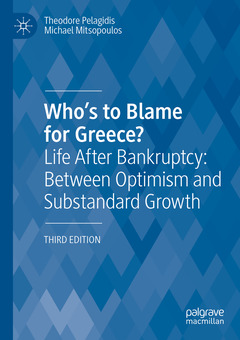Who’s to Blame for Greece? (3rd Ed., 3rd ed. 2021) Life After Bankruptcy: Between Optimism and Substandard Growth
Auteurs : Pelagidis Theodore, Mitsopoulos Michael

This expanded and enlarged third edition of Theodore Pelagidis and Michael Mitsopoulos? popular Who?s to Blame for Greece? covers almost a decade of Greece's economic crisis from 2009 to 2019, as well as recent developments in the first months of 2020. It provides an overview of recent developments in the Greek economy and outlines the most important obstacles to a return to robust and sustainable growth rates. It considers the new optimism being developed in Greece after the crisis, but also the policy challenges facing Greece emanating from a deeply hurt economy in the aftermath of the crisis and the structural problems that persist.
The book covers the most recent issues that affect the Greek economy including, the migration crisis at the borders with Turkey as well as a faltering global economy hit by the Covid-19 pandemic. This book will appeal to researchers, practitioners and policy makers interested in the EU and the political economy of Greece and offers valuable updates on the second edition.
Theodore Pelagidis is the Deputy Governor of the Bank of Greece (since September 2020) and Professor of Economics at the University of Piraeus, Department of Shipping, Greece. He has been a NR senior fellow at the Brookings Institution during 2012-2020, a NATO scholar at the Center for European Studies at Harvard University, USA (1995); an NBG fellow at the London School of Economics, UK (2010); and an Onassis scholar and Fulbright fellow at Columbia University, USA (2008). He has also served as an expert to the IMF in the Internal Evaluation Office (2015) and to EC (Horizon, 2018).
Michael Mitsopoulos is Director in Business Environment and Regulatory Affairs at the Hellenic Federation of Enterprises, Greece. He holds a PhD in Economics from Boston University and has taught at the University of Piraeus and the Economic University of Athens. He has published extensively in academic journals and is the co-author with Pelagidis of Understanding the Crisis in Greece: From Boom to Bust (Palgrave Macmillan, 2011 & 2012 2nd ed.) and of Greece. From Exit to Recovery? (Brookings, 2014).
Presents the latest, up to date, research on Greece's economy since Grexit
Provides an overview of recent developments in the Greek economy and outlines the most important obstacles to a return to robust and sustainable growth rates.
Covers the most recent issues that affect the Greek economy including, the migration crisis at the borders with Turkey as well as a faltering global economy hit by the Covid-19 pandemic
Addresses debt and debt release from multi-disciplinary, analytical perspectives
Date de parution : 05-2022
Ouvrage de 432 p.
14.8x21 cm
Disponible chez l'éditeur (délai d'approvisionnement : 15 jours).
Prix indicatif 126,59 €
Ajouter au panierDate de parution : 05-2021
Ouvrage de 432 p.
14.8x21 cm
Disponible chez l'éditeur (délai d'approvisionnement : 15 jours).
Prix indicatif 126,59 €
Ajouter au panierThèmes de Who’s to Blame for Greece? :
Mots-clés :
Greece; Eurozone; IMF; ECB; Monetary Union; EU; Export-led growth; Public finance; Financial crisis; Macroeconomic stability; Tax system reform



